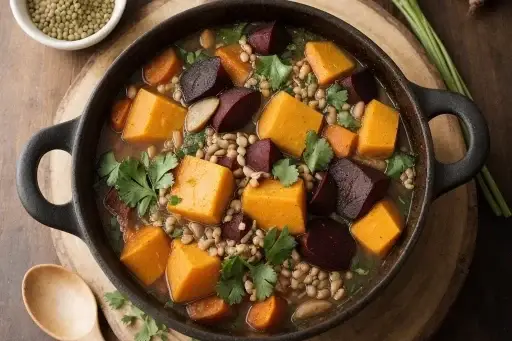Welcome to WellHealthOrganic.com, your trusted ally in holistic wellness. In this enlightening exploration, we delve into the profound wisdom of Ayurveda and its transformative potential when applied to our evening meals. Join us as we uncover the principles, benefits, and delicious recipes that define Ayurvedic dinners, guiding you toward a deeper connection with your body, mind, and spirit.
Embarking on an Ayurvedic Journey
Ayurveda, the ancient science of life, offers a holistic approach to well-being that emphasizes harmony and balance in all aspects of our existence. At the heart of Ayurveda lies the belief that optimal health is achieved through alignment with nature’s rhythms and the unique constitution of each individual. Ayurvedic dinners serve as a powerful tool for restoring equilibrium, supporting digestion, and nurturing vitality from within.
The Core Principles of Ayurvedic Dinners
- Dosha Harmony: Central to Ayurvedic philosophy are the three doshas—Vata, Pitta, and Kapha—that govern our physical, mental, and emotional characteristics. Ayurvedic dinners are carefully crafted to balance these doshas, ensuring harmony and well-being.
- Seasonal Wisdom: Ayurveda teaches us to honor the changing seasons by selecting fresh, seasonal ingredients that align with nature’s cycles. By embracing seasonal eating, we support our bodies’ natural rhythms and promote optimal health and vitality.
- Six Tastes, One Harmony: According to Ayurveda, each meal should contain a balance of all six tastes—sweet, sour, salty, bitter, pungent, and astringent—to satisfy the palate and nourish the body. By incorporating a variety of tastes into our dinners, we ensure satisfaction and balance.
- Mindful Nourishment: Ayurveda encourages us to approach our meals with mindfulness and gratitude, savoring each bite and cultivating awareness of our body’s signals. By eating mindfully, we enhance digestion, reduce stress, and deepen our connection with food.
Crafting Your Ayurvedic Dinner Experience
- Discover Your Dosha: Begin by identifying your dominant dosha—Vata, Pitta, or Kapha—to tailor your Ayurvedic dinner to your unique constitution. This will guide your ingredient selection and help create a meal that supports balance and harmony.
- Embrace Seasonal Bounty: Select fresh, organic ingredients that are in season and resonate with your doshic type. Embrace the abundance of fruits, vegetables, whole grains, legumes, and spices available each season, allowing nature to nourish and sustain you.
- Create a Balanced Plate: Build your Ayurvedic dinner around a balanced combination of carbohydrates, proteins, and healthy fats. Experiment with different food pairings and flavor profiles to create a meal that satisfies both your palate and your body’s needs.
- Infuse with Ayurvedic Spices: Enhance the flavor and therapeutic properties of your Ayurvedic dinner with a selection of Ayurvedic spices and herbs. From warming ginger and turmeric to cooling mint and coriander, these spices not only add depth to your dishes but also offer a multitude of health benefits.
- Savor the Experience: Take time to savor and enjoy your Ayurvedic dinner in a peaceful and relaxed environment. Chew each bite slowly and mindfully, allowing the flavors to unfold and nourish your body and soul.
Sample Ayurvedic Dinner Recipes
- Vata-Balancing Dinner: Creamy coconut lentil curry with sweet potatoes, sautéed kale with toasted sesame seeds, and quinoa pilaf with warming spices like cinnamon and cloves.
- Pitta-Soothing Dinner: Cooling cucumber and avocado salad with lime dressing, grilled tofu with cilantro and mint chutney, and basmati rice with fresh herbs and a squeeze of lemon.
- Kapha-Stimulating Dinner: Spicy chickpea stew with ginger and turmeric, roasted Brussels sprouts with mustard seeds and chili flakes, and millet pilaf with roasted vegetables and a sprinkle of parsley.
Ayurvedic Principles For Dinner
1. Eat Light and Easy to Digest Dinner:

Ayurveda suggests that our digestive fire (Agni) is weaker in the evening. Hence, dinners should be lighter compared to lunch, ensuring they can be easily digested before bedtime. This aids in promoting a good night’s sleep and overall well-being.
2. Eat Well Cooked and Warm Dinner

Ayurveda recommends warm, cooked food in the evening to appease the digestive system and promote maximal nutrient absorption
3. Dosha Balancing:
Knowing your dominant dosha and choosing the right kind of food can therefore be a great key to keeping good health. For example, Vata does much better with grounding, moist, and warming foods. Pitta does much better with cooling and calming meals, and Kapha with light, exciting dishes.
Ayurvedic Dinner Ideas
1. Vata-Balancing Stew:

Have a meal, say, the nourishing stewed root vegetables (for example, sweet potatoes, carrots, and beets), together with the mung beans and warming spices (for example, ginger and cumin). Take all these, grounding and moist—perfect to counter the dry and light qualities of Vata.
2. Pitta-Pacifying Khichdi:

Khichdi is a traditional Indian food made from rice and lentils. It pacifies Pitta. The best way to prepare it is to add cooling spices like fennel and coriander, along with vegetables such as zucchini and kale to it, to make it wholesome and light for the digestive system.
3. Kapha-Invigorating Barley Soup:

Barley soup in a light vegetable broth, with leafy vegetables like spinach and some exciting spices such as black pepper and turmeric, can be good for Kapha without overburdening the system.
4. Tri-Dosha Balancing Quinoa Pilaf:

A quinoa pilaf, when combined with seasoned veggies like carrots, peas, and asparagus, mixed with mild spices like turmeric and coriander, and topped with a squeeze of fresh lime juice, would be ideal in balancing all the three doshas and hence can be perfect for a family having varied body types.
Conclusion
Elevate your well-being and nourish your body and soul with Ayurvedic dinners. By embracing the wisdom of Ayurveda and crafting meals that honor your doshic constitution and the rhythms of nature, you can promote balance, vitality, and harmony in your life. Explore the delicious and healing world of Ayurvedic dinners with WellHealthOrganic.com as your guide, and embark on a journey to holistic wellness today.
